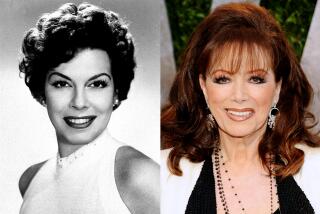Roxane Gay’s new book ‘Difficult Women’ proves her power
In her new short-story collection “Difficult Women,” Roxane Gay is razor sharp on the constant contradictions of being a woman — the terrible mundanity and the terrible violence of it all, and the way these two things rub up against each other so fondly.
In 2014, Gay seemed to be everywhere, with Time declaring it “the year of Roxane Gay” after the publication of a book of essays, “Bad Feminist,” and her debut novel, “An Untamed State.” The essays were exciting because she put a label on a debate that had been stewing for a long time. If the term “bad feminist” doesn’t sound that revolutionary from a 2017 perspective, in the 2014 maelstrom of heated arguments about what feminism means and who is doing it “right,” her collection of essays came just at the right moment. Suddenly the phrase bad feminist was everywhere, and Gay managed to strike a chord on how complex intersectional feminism is. Not that these debates have gone away, but they have evolved, thanks in part to Gay opening up the conversation.
“Bad Feminist” was published in Britain while I was working as the literary editor for Elle UK and although it was enjoyed in the office, it was ultimately not mentioned in the magazine after being deemed “too American” by my editor. But Gay’s reputation spread: Everyone was asking if you’d read “Bad Feminist,” and she was a veritable phenomenon in the U.S. So when I received a proof copy of her new collection of short stories from her U.K. publisher, I was interested in the way I am always curious about writers who elicit excitement when they create something new.
“Difficult Women” is about many kinds of women; they vary in race, ethnicity, sexuality and age. It is about sisters, friends, daughters and wives, although those simple labels belie complicated relationships. Many of the relationships are with men, but the really interesting ones are about the bonds between women, and two of the most affecting stories concern sisters (“I Will Follow You” and “How”).
These short stories have given Gay’s writing and ideas a way to transcend boundaries in a way “Bad Feminist” couldn’t and reveal her to be a writer as interested in form and language as she is in social commentary.
The stories are explicitly or implicitly set in the U.S. but they feel universal in a way nonfiction never truly can, because it does not need to be mired in the particular or the accurate. Gay then builds on this feeling by the clever use of magical realism. There’s a distinct echo of Angela Carter or Helen Oyeyemi at play; dark fables and twisted morality tales sit alongside the contemporary and the realistic, although the majority of them have some element of magic or the surreal at play.
These short stories... reveal her to be a writer as interested in form and language as she is in social commentary.
There are common themes throughout the collection, but you never know what you are going to get next. Dark twists move to happy endings, brutality moves to romance from story to story. Although most are straight prose there are moments of narrative playfulness. “Florida” features snapshots of different lives within a gated community in Naples, and in the title story, a taxonomy of different types of women is used to great effect: loose women, frigid women, crazy women. Each woman is divided into sections: “What a Loose Woman Sees in the Mirror”; “What a Crazy Woman Thinks About While Walking Down the Street.” The respective answers are: “Nothing. She doesn’t look. She doesn’t need to. She knows exactly who she is,” and “It’s the presumption in the way he doesn’t hide his interest that makes her hold the sharp letter opener in the cool palm of her hand.” The story ends with dead women: “Death makes them more interesting. Death makes them more beautiful.”
The stories are frequently about sex or rape but are not titillating or gratuitous; they are harrowing and unflinching. The scenes of sexual violence feel relevant, raw and true to life, and they are effectively contrasted against scenes of consensual, if rarely gentle, sex. Among them are a handful of unashamed, unusual, love stories; “North Country” is about a tentative relationship in snowy Michigan and “The Sacrifice of Darkness” is a fable about the legacy of a man who flies into the sun.
The longer stories are almost always the most successful; managing to balance clever concepts with a more languid reveal. The very short, “flash” stories can collapse a little under the weight of the one idea or line that birthed them. Having said that, of a collection of 21 stories, eight were truly exceptional pieces of storytelling and I actively disliked only one (“A Pat,” the shortest story, which seemed a touch trite to me, standing out in a collection that mostly fiercely resists cliches and convention).
That she slips seemingly effortlessly among the voices of these different, difficult women is perhaps the core of why new writing from Gay is so exciting to so many readers. The stories feel like snapshots of real lives, even the more fantastical stories.
It is a book about the violence done to women and the violence of being a woman. The book is dedicated: “For difficult women, who should be celebrated for their nature” but it is not quite a celebration but more of a history and a testament. It feels like the book we have been waiting for Gay to write.
Anna James, @acaseforbooks, is an author and journalist living in London.
::
Roxane Gay
Grove Press: 272 pp., $25
More to Read
Sign up for our Book Club newsletter
Get the latest news, events and more from the Los Angeles Times Book Club, and help us get L.A. reading and talking.
You may occasionally receive promotional content from the Los Angeles Times.






